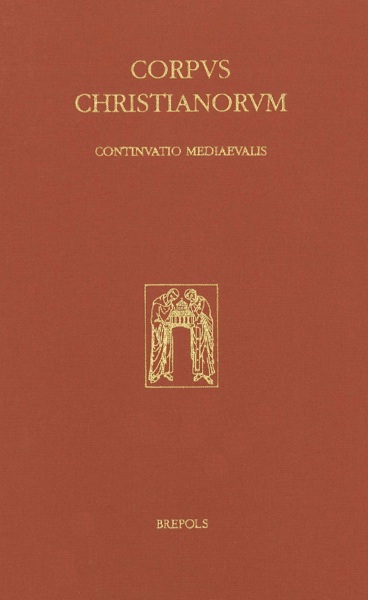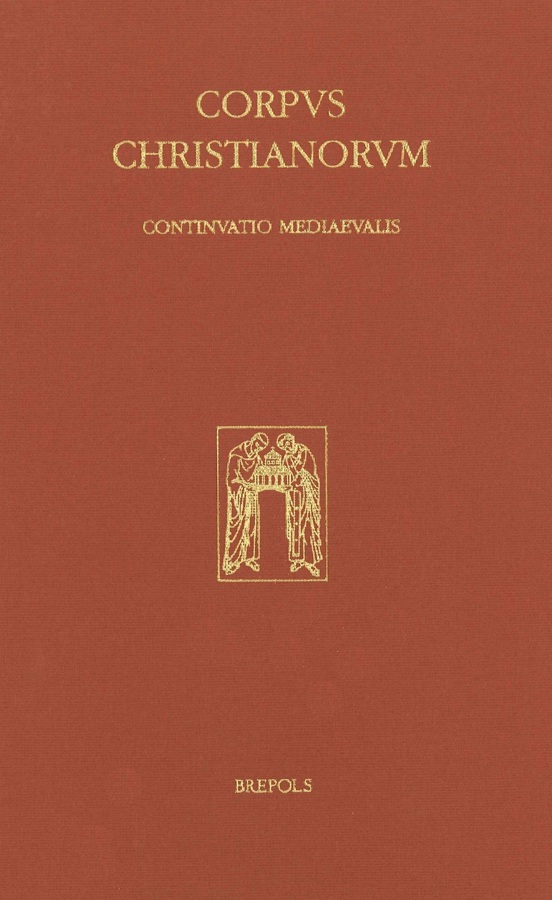
Glosae in regula Sancti Benedicti abbatis ad usum Smaragdi Sancti Michaelis abbatis
Matthieu van der Meer
- Pages: 366 p.
- Size:155 x 245 mm
- Illustrations:4 col.
- Language(s):Latin, English
- Publication Year:2017
- € 290,00 EXCL. VAT RETAIL PRICE
- ISBN: 978-2-503-57276-5
- Hardback
- Available
"This new edition of the Glosae is a monumental achievement of Benedictine scholarship that will endure for generations. It is sure to advance future research on the reception history of the Regula Benedicti, the modes of instruction by which new monks learned its principles, and the meaning of this fundamental work in the context of the Carolingian reforms of monastic life. Given the importance of the Regula Benedicti in the western tradition, it is shocking that this anonymous commentary has gone unnoticed for long, so we are in debt to van der Meer not only for bringing it to light in this painstaking and valuable contribution to monastic studies but also for reminding us that the future of early medieval scholarship lies in the undiscovered country of the thousands of manuscripts produced in western Europe in the ninth century." (Scott G. Bruce, in The Medieval Review, 17.12.21)
“Ein bedeutender Mosaikstein für die Frühgeschichte des Benediktinertums im Frankenreich.” (C. L., in Deutsches Archiv, 74, 2018, p. 255)
“The edition and its apparatus are of the usual high standard associated with the Corpus Christianorumseries, and together with the appendices (xcii–cv) and indices (237–363) provide the reader with all the tools required to study this fascinating text and the monastic minds behind it (…) van der Meer’s willingness to embrace the complexities he encountered will open the door for future researchers eager to engage with this important episode in the development of monasticism in the West.” (Rutger Kramer, in Speculum, 95, 2020, p. 305-306)
"In conclusione, l’editio princeps delle Glosae in Regula Benedicti fornisce un testo affidabile, ricostruito sulle solide fondamenta dell’analisi puntuale della tradizione manoscritta. La fatica di Matthieu H. van der Meer rende oggi facilmente accessibile un’opera imprescindibile per la corretta comprensione dell’Expositio di Smaragdo, nonché della ricezione del Liber glossarum e della Regula Benedicti nel mondo carolingio." (Marina Giani, in Archivum Latinitatis Medii Aevi, t. 76, 2018, p. 370)
« Le beau volume (...) 282 par Matthieu H. van der Meer, s’inscrit parfaitement dans les perspectives de recherches contemporaines qui s’intéressent à des textes trop longtemps dédaignés, je veux parler du genre « gloses » (…) Ceci dit, le travail remarquable de M. v. d. M. ne manque ni de précision ni d’intérêt, car grâce à ce document édité avec soin, nous avons en main les clés de la composition de l’Expositio in Regulam sancti Benedicti de Smaragde. » (Franck Cinato, dans la Revue d'Histoire ecclésiastique vol. 117/1-2, 2022, p. 327-331)
Matthieu van der Meer received his Ph.D. in philosophy at the Rijksuniversiteit Groningen, Netherlands (2006) and is currently Assistant Professor of Classics at the Department of Languages, Literatures and Linguistics at Syracuse University, Syracuse, NY.
The Glosae de diuersis doctoribus collectae in regula S. Benedicti abbatis is a unique source for analyzing how scholars contextualized and read the text chosen to guide Carolingian monastic reforms. The Glosae consists of two parts, a catena-glossary of ca. 1100 elementary terms of the Regula Benedicti, and a florilegium of more than 360 extracts from a wide range of biblical and patristic texts. Both the glossary and the florilegium follow closely the chapters of the Regula Benedicti. Especially the glossary indicates that the Regula had a curious double function of a text to be studied and a text that was used as a tool for learning Latin. Moreover, the glossary is one of the earliest witnesses to the popularity of the Liber Glossarum in the early ninth century. Like the Liber Glossarum, the Glosae testifies to that remarkable Carolingian spirit of ordering, correcting, preserving, and renewing ancient wisdom. Both the glossary and the florilegium have been used by Smaragdus of St-Mihiel (d. c. 827), the chief monastic reformer of his generation, for the Expositio in regulam Sancti Benedicti – the oldest and best known commentary to the Rule. The florilegium of the Glosae is structured in a way that is similar to Benedict of Aniane’s Concordia Regularum, a work that juxtaposes the Regula Benedicti with other monastic rules. The Glosae provides a counter model to the Concordia’s normative understanding of the Regula Benedicti by contextualizing it with ascetical, doctrinal, exegetic and pastoral texts.





